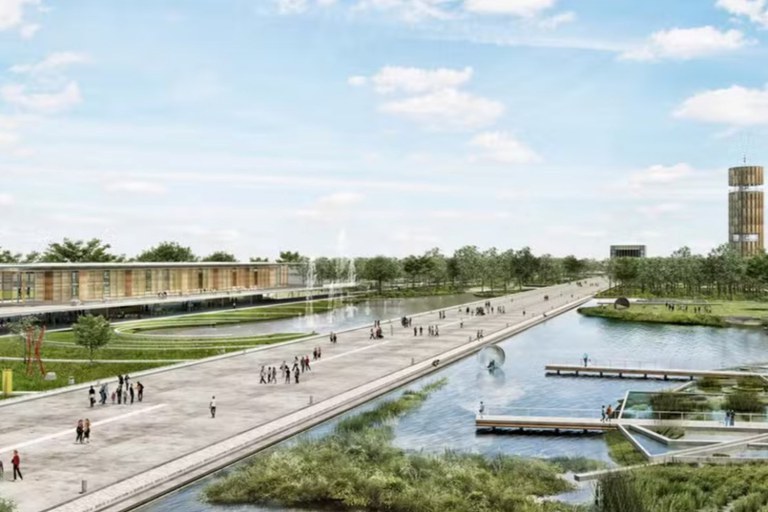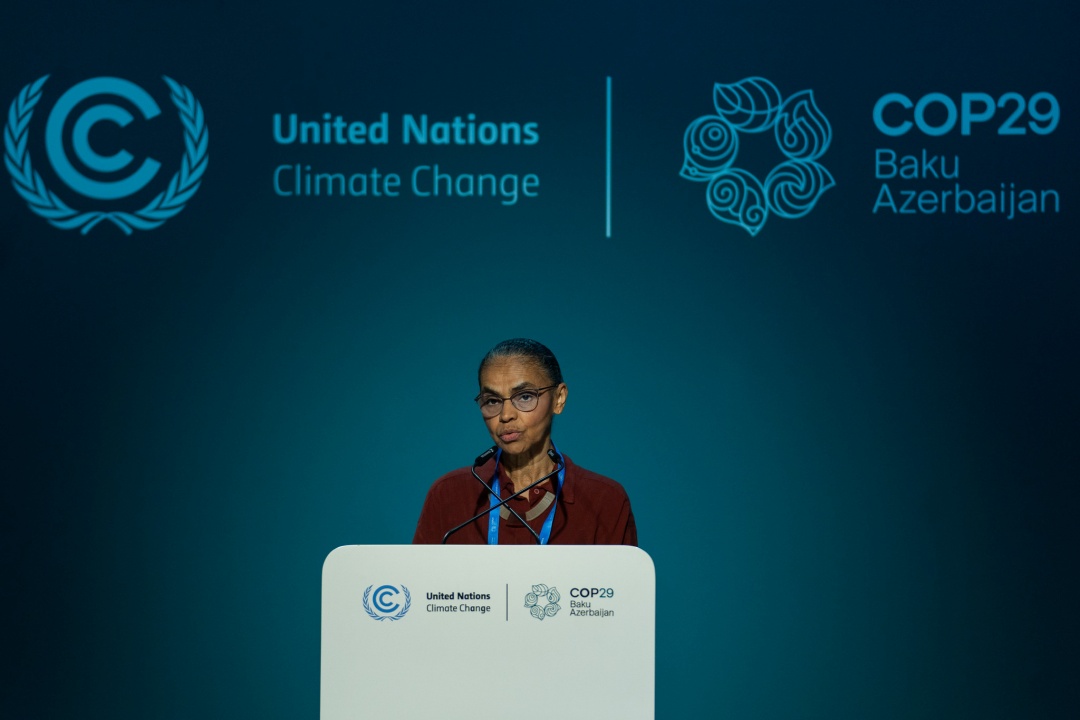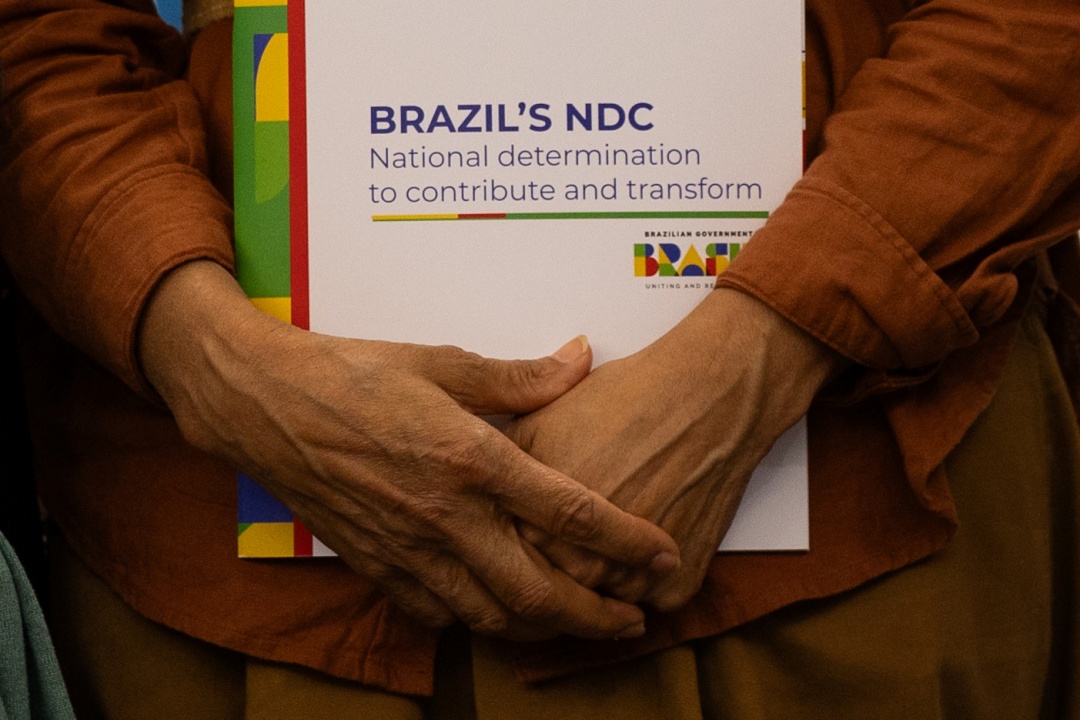Notícias
CLIMATE CHANGE
COP30: Brazil works to consolidate diplomatic leadership in climate agenda

Illustration showing how Parque da Cidade will look like in Belém, where COP30 will be held in November 2025. - Credit: Reproduction / Government of Pará
The first time a United Nations Conference on Climate Change will be held in an Amazon city. The immense challenge of making commitments and investments to avoid and mitigate the effects of global warming and climate change. Brazil's innovative and respected environmental solutions on display in the largest possible showcase. And the responsibility of Brazil's track record of diplomatic competence as a mobilizing factor.
COP30 will be a milestone in reinforcing Brazil's role as a protagonist in the global climate agenda. The consequences of COP29 challenge us to build a more ambitious conference focused on results. This requires leading by example, promoting regional and global coordination so that we can take a historic step forward in tackling the climate crisis”
Marina Silva, minister for the Environment and Climate Change
These are highlights of the agenda for COP30, to be held in Belém, state of Pará, between November 10 and 21, 2025. In addition to the intense mobilization of the federal and state governments and the capital of Pará to prepare the city's infrastructure for an unprecedented influx of heads of state, authorities and representatives of environmental organizations from all over the world, Brazil is preparing to act intensely behind the scenes.
» One year ahead of COP30, Belém is transformed to host the Climate Summit
“COP30 will be a milestone in reinforcing Brazil's role as a protagonist in the global climate agenda. The consequences of COP29 challenge us to build a more ambitious conference focused on results. This requires leading by example, promoting regional and global coordination so that we can take a historic step forward in tackling the climate crisis,” said Minister for the Environment and Climate Change Marina Silva. “The good news for the world is that Brazil is committed to this effort, and will exercise its leadership and its recognized capacity for dialogue and negotiation so that we leave Belem with more ambitious results.”
NEGOTIATIONS — In this context, the preliminary phase of agreements and negotiations is considered essential if the 11-day event is to consolidate Brazil's role as a protagonist in environmental geopolitics. “I believe that a lot will be done this year during the presidency-designate. As is the practice in the UN Convention, most of the work of the Brazilian presidency will be in the run-up to COP30,” explained the secretary for Climate, Energy and the Environment at the Ministry of Foreign Affairs [Ministério das Relações Exteriores], Ambassador André Corrêa do Lago.
According to him, one of the challenges is the expectation that has been created with regard to the Brazilian presidency, given Brazil's diplomatic tradition of playing a significant role in the climate agenda. “It is going to be an extremely intense year of action to ensure that COP30 brings the best possible results,” he said.
Belém will be the setting for intense discussions on the agenda of the Climate Convention and the Paris Agreement. The role of tropical rainforests, the protection of essential biomes, and the importance of a development model that respects the rights of indigenous and traditional peoples are also to be addressed. Brazil will strive to increase international support for the implementation of policies for environmental preservation, sustainable development and combating the degradation of ecosystems.
“One of the challenges concerns the extent to which Brazil can bring to COP30 the knowledge of climate solutions that Brazilian society itself is developing. Brazil harbors exemplary initiatives, programs and experiences. It can therefore benefit in two ways: from what it is already doing, which is unique, and from what it can do, given its internationally recognized leading role. This will bring enormous benefits to the Brazilian economy, positioning Brazil as a leader in the new economy, because all climate solutions require economic solutions,” said the ambassador.

Brazil harbors exemplary initiatives, programs and experiences. It can therefore benefit in two ways: from what it is already doing, which is unique, and from what it can do, given its internationally recognized leading role. This will bring enormous benefits to the Brazilian economy, positioning Brazil as a leader in the new economy, because all climate solutions require economic solutions”
André Corrêa do Lago, secretary for Climate, Energy and Environment at the Ministry of Foreign Affairs
G20 ENFORCEMENT — Brazil's ability to influence major issues in international forums was on display in 2024, under the Brazilian presidency of the G20, which culminated in the meeting of Heads of State in November in Rio de Janeiro. The Brazilian presidency spotlighted environmental debates and climate negotiations within a bloc representing two-thirds of the world's population, 85% of global GDP, 80% of emissions, and 75% of international trade. In the final declaration, the bloc’s governments announced measures to accelerate the expansion of financial flows aimed at implementing climate actions, ecological transformation and strengthening the role of multilateral banks in the fight against climate change.
“We are actively working to promote dialog within nations, seeking convergence between the demands of developing countries and the responsibilities of developed countries. Brazil has a unique role as a bridge that connects the global North and South and is committed to leading with ethics, commitment and a vision of the future that prioritizes life and planetary balance. The presidency of the G20 reaffirmed these attributes, in concert with multilateral organizations and with absolute respect for the autonomy of nations,” emphasized Marina Silva.
At the G20 Summit, countries reinforced their commitment to increasing climate action to limit the temperature increase to 1.5ºC, tripling global renewable energy capacity by 2030 and transitioning away from the use of fossil fuels in energy systems. They also advocated reforming the global financial system to make it more efficient in combating climate change and promoting sustainable development.
» Full text of the Final Declaration of the nations at the G20 Summit in Rio de Janeiro
The nations emphasized the role of sustainable development in its three dimensions — economic, social and environmental — and reaffirmed their commitments to step up urgent action to tackle the crises and challenges arising from climate change, biodiversity loss, desertification, ocean and soil degradation, droughts and pollution.
“We reaffirm the temperature goal of the Paris Agreement to limit the increase in the global average temperature to far below 2 degrees Celsius above pre-industrial levels and to undertake efforts to limit the increase to 1.5 degrees Celsius above pre-industrial levels, recognizing that this would significantly reduce the risks and impacts of climate change,” indicated the final declaration of the G20 Leaders' Summit.

- In Baku, Brazil presented the goal of reducing its net greenhouse gas emissions by between 59% and 67% by 2035.
POSSIBLE AGREEMENT — The strategic nature of COP30 was further reinforced by the feeling that the agreements reached at COP29 in Baku fell short of what experts had hoped for, especially the New Collective Quantified Goal (NCQG) for climate finance under the Paris Agreement. The text established that developed countries should provide at least 300 billion dollars a year by 2035 to developing countries, with the aim of supporting them in implementing actions to reduce greenhouse gas emissions (mitigation) and adapt to the impacts of climate change. The resources should come from public, private, bilateral, multilateral and alternative sources. The horizon advocated from scientific analysis of the size of the challenge was much more ambitious, at USD 1.3 trillion per year.
The figures fall far short of what is needed, but in the face of geopolitics, this is where we managed to get to, and it was important, even if minimal, for the funding not to stop, for the political signal that multilateralism remains fundamental for debating these resources”
Ana Toni, national secretary for Climate Change at the Ministry of the Environment
“The figures fall far short of what is needed, but in the face of geopolitics, this is where we managed to get to, and it was important that we reached a figure, even if it was minimal, so that funding would not stop, for the political signal that multilateralism remains a fundamental space for debating these resources,” emphasized Ana Toni, national secretary for Climate Change at the Ministry of the Environment and Climate Change [Ministério do Meio Ambiente e Mudança do Clima].
Ambassador André Corrêa do Lago points out that, even though the result reflects the challenges of a context marked by conflict, it was important to reach an agreement. “There was no surprise, from the Brazilian point of view, that the result was no more than the figures that came out on paper,” said the ambassador, aware that the agreed figures are unlikely to meet real demands.
“We are not a country that needs donations. We need investment. We think that, unfortunately, when it comes to talking about finance, rich countries forget the measure of urgency regarding climate change. They talk a lot about urgency when they talk about targets, initiatives and NDCs. But when it comes to talking about finance, the element of urgency is kind of forgotten. This is serious, because we know that we only have a few years ahead of us to do what is necessary to prevent us from exceeding 1.5ºC,” he pointed out.
» Brazil presents new climate target aligned with Mission 1.5ºC
RESPONSIBILITY — It was with this broad context in mind that the Minister for the Environment and Climate Change, Marina Silva, spoke at the closing plenary of COP29 in Baku, when Brazil symbolically received the baton for COP30. “It is with a great sense of responsibility — and awareness regarding the great collective challenge that is being handed to us — that Brazil receives the designated presidency of the Conference of the Parties from Azerbaijan. We know how we got here and the challenges that lie ahead for each one of us,” stated the Minister, Marina Silva.
AMBITION — Marina stressed that the work will be built on decades of negotiations and commitments, such as the Paris Agreement, COP28 in Dubai and COP29 in Baku. “What we need to achieve at COP30 will be the result of what we have been able to create over more than three decades with the threads of our ethical and political commitments,” she emphasized. “The most important thing for each of us is the balance of the chain of life on Earth, the balance of the planet. By COP30, our goal will be to align NDCs that are ambitious enough to achieve the 1.5ºC mission,” she pointed out.
BRAZILIAN INITIATIVES — On the shelf of initiatives that Brazil will have to present around the “homework” it has been doing, there are ambitious commitments, including the reduction of greenhouse gas emissions, zero deforestation by 2030 and visionary financing strategies.
BIP — One of these initiatives is the Brazil Climate and Ecological Transformation Investment Platform (BIP), created with the ambition of expanding investments in the ecological transformation towards the decarbonization of the economy, the sustainable use of resources and the quality of life of the population. The tool seeks to diversify sources of investment in the transition, in support of the government's Ecological Transformation Plan in key sectors, serving as an example for other countries seeking to integrate their ecological transformations and climate targets.
» Learn more about BIP
FOREST FUND — Another Brazilian proposal for the preservation and restoration of tropical forests is the Tropical Forest Forever Facility (TFFF). The TFFF, presented during COP28 in Dubai, United Arab Emirates, aims to pay developing countries that conserve their tropical forests, earmarking the capital invested for green assets and applying the return to keep the forests standing. The initiative provides for payments per hectare of standing vegetation, with a penalty for deforested or degraded hectares, and ensures additional resources for the protection of biodiversity, traditional territories and the maintenance of environmental services. The mechanism will be launched at COP30 in Belém.
LEGACIES
CARBON MARKET — At COP29, countries concluded the regulation of the global structure of carbon markets, provided for in Article 6 of the Paris Agreement. The milestone comes after nine years of negotiations since the Agreement was adopted in 2015. Important issues were resolved for the implementation of Articles 6.2, which regulates the exchange of mitigation results among countries, and 6.4, which establishes a global mechanism for generating private carbon credits under the UN Climate Convention.
GLOBAL ADAPTATION TARGET — The conference approved the decision on defining methodologies for the indicators of the Global Adaptation Target, defined in 2023 during COP28 in Dubai. The document sets out criteria, guidelines and a timetable so that it is possible to arrive at COP30 with a consistent proposal to be agreed among the parties on the global indicators. The text also proposes a manageable set of no more than 100 globally applicable indicators that reflect national circumstances and consider information related to social inclusion, indigenous peoples, participatory processes, human rights, gender equality, migrants, children and young people and people with disabilities, as well as specific ecosystems.
ACHIEVEMENT — “It was an important victory for Brazil, mainly because of the possibility of forest restoration projects and programs and products with a low carbon footprint, because of our electricity. These agreements were advances, and now we have to make them a reality. Now we have to discuss the methodologies in detail. This comes at a good time, because we also approved the national carbon market in Congress,” said Secretary Ana Toni.